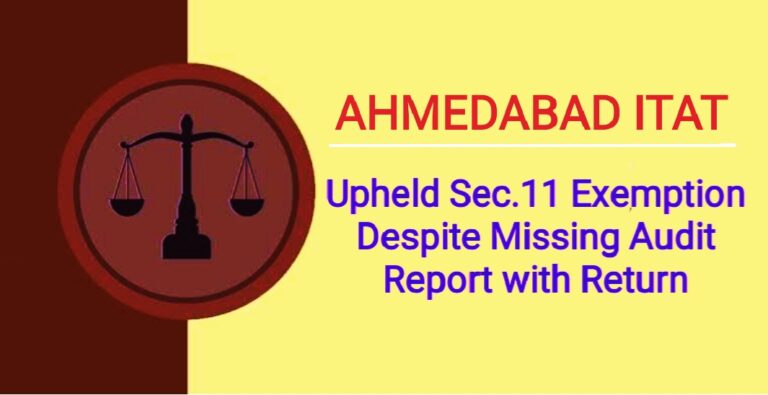The ITAT noted that the non-compliance under Section 12A of the Act is a procedural lapse, and when the Audit Report was eventually filed, it should have been considered for Section 11 Exemption.
ITAT Ahmedabad Ruling on Section 11 Exemption: In a recent ruling in case of Karma Falya Trust vs DCIT [ITA No.10/Ahd/2023/AY2018-19], the Ahmedabad bench of the Income Tax Appellate Tribunal (ITAT) has upheld an exemption under Section 11 of the Income Tax Act, 1961, even though the taxpayer failed to file the audit report along with the income tax return (ITR).
The case involved Karma Falya Trust, which had filed an income tax return for the Assessment Year 2018-19, declaring a total income of Rs. Nil after claiming an exemption of Rs.15,37,255/- under Section 11 of the Income Tax Act, 1961.
Subsequently, the income tax return was processed under Section 143(1) of the IT Act, disallowing the claimed exemption of Rs.15,37,255/- under Section 11 of the Income Tax Act due to the non-filing of the Audit Report by the taxpayer.
Challenging this, the taxpayer approached the CIT(A) against the Assessment Order. The CIT(A) partially allowed the taxpayer’s petition.
Representing the taxpayer before the tribunal, Divyang Shah, the taxpayer’s AR, argued that if Form No.10B for the trust is not filed along with the income return, but is submitted during the assessment or appellate proceedings, then the exemption under Section 11 of the IT Act should not be rejected solely based on the absence of the Audit Report under Section 12A of the Act with the Income Tax Return.
The argument further stated that the non-compliance under Section 12A of the Act is a procedural lapse, and when the Audit Report was eventually filed, it should have been accepted.
On the other side, Santosh Kumar, the Department representative (DR), contended that the taxpayer submitted the Audit Report after the stipulated date as per the Income Tax Statute, leading the CIT(A) to deny the exemption.
Upon review, the tribunal noted that the taxpayer received the audit report on 31.10.2018 but faced technical difficulties in uploading it on the Income Tax Portal within the deadline.
Considering these circumstances, the tribunal found that the CIT(A) should have acknowledged this delay and the Assessing Officer (AO) should have considered the Audit Report for granting the exemption under Section 11 of the Income Tax Act to the assessee.
As a result, the single-member bench, Suchitra Kamble (Judicial Member), upheld the taxpayer’s plea, allowing the exemption under Section 11 despite the initial failure in filing the Audit Report.
This decision highlights the tribunal’s understanding of procedural challenges faced by taxpayers and ensures a fair approach to granting exemptions under the Income Tax Act.
To Know about Tax Benefits of NPS under Income Tax CLICK HERE
Also Read
